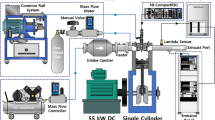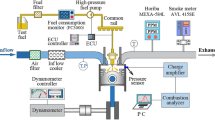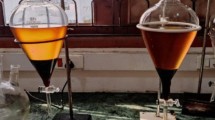Abstract
KNOCKING combustion (detonation) in Otto-cycle engines using hydrocarbon fuel is attributed by King1 to the effect of finely divided carbon in igniting the unburned combustible mixture ahead of the flame front (the end gas). The carbon particles can, according to this view, be provided (a) by pyrolysis of the hydrocarbon at the high pressure and temperature attained by the end gas, or (b) by impingement of the flame on relatively cool surfaces in the combustion space, as in a method commonly used for procuring carbon black.
This is a preview of subscription content, access via your institution
Access options
Subscribe to this journal
Receive 51 print issues and online access
$199.00 per year
only $3.90 per issue
Buy this article
- Purchase on Springer Link
- Instant access to full article PDF
Prices may be subject to local taxes which are calculated during checkout
Similar content being viewed by others
References
King, R. O., Can. J. Research, F, 26, 228 (1948).
Author information
Authors and Affiliations
Rights and permissions
About this article
Cite this article
KING, R., DURAND, E. & ALLAN, A. Exceptional Performance of a Nuclear Ignition Otto-cycle Engine using n-Pentane as Fuel. Nature 166, 70–71 (1950). https://doi.org/10.1038/166070b0
Issue Date:
DOI: https://doi.org/10.1038/166070b0
Comments
By submitting a comment you agree to abide by our Terms and Community Guidelines. If you find something abusive or that does not comply with our terms or guidelines please flag it as inappropriate.



